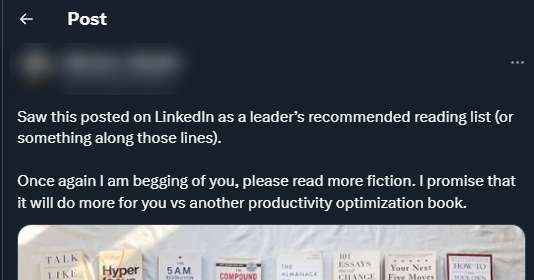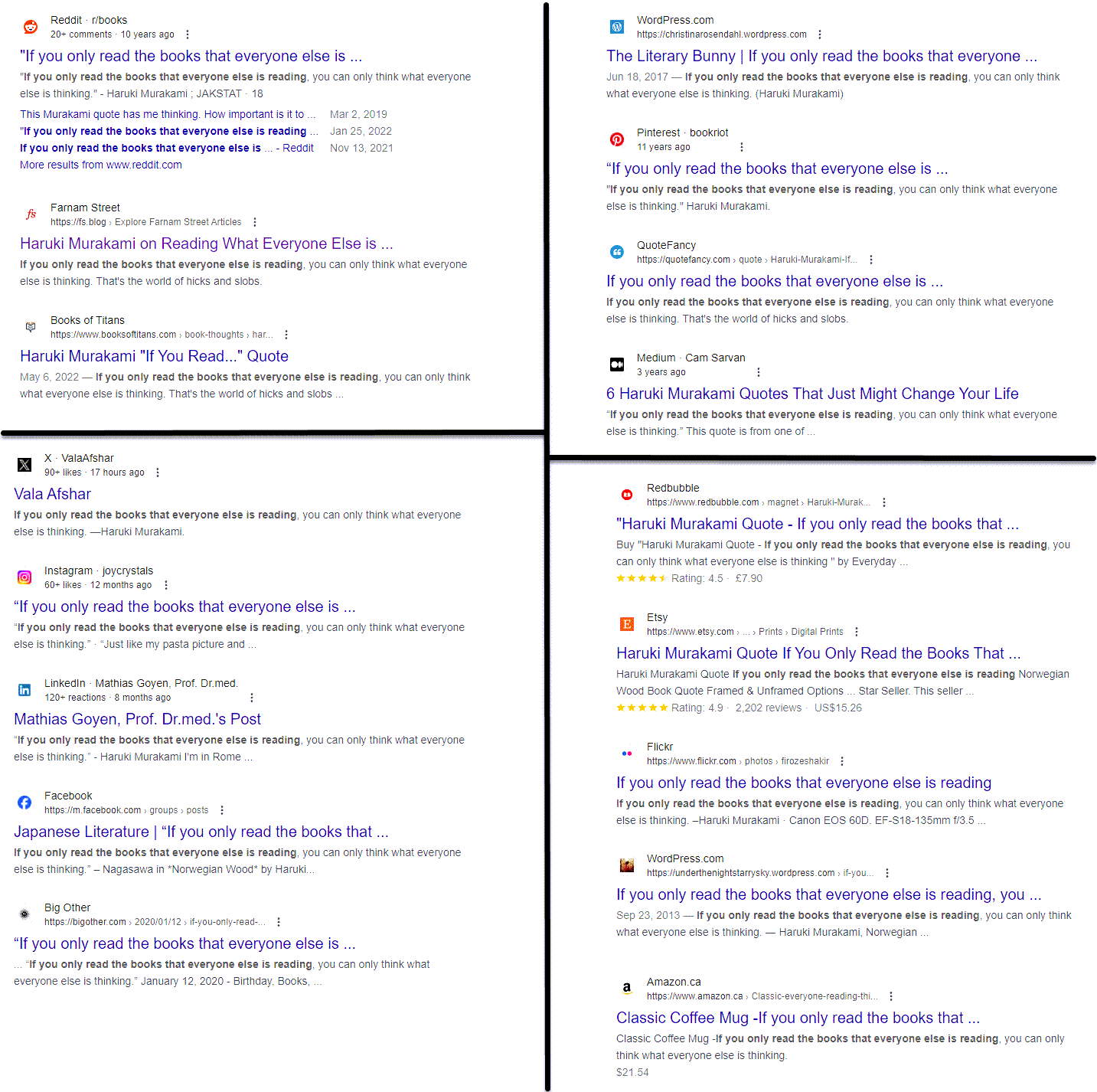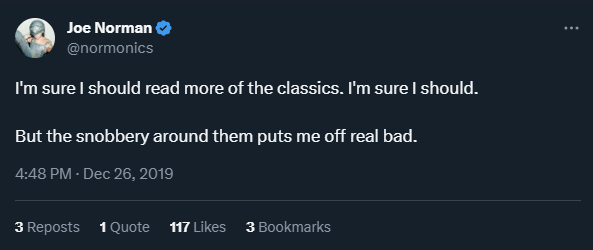Dive 65: Why snobbery is a plague on society
Hey, it’s Alvin!
Have you ever read a book and felt somewhat embarrassed to admit you read it? Because you just know someone out in the world will say or think, “you read THAT book? It’s such a dumb, juvenile piece of trash.”
I feel that way sometimes.
But it’s important to remember that a condescending attitude like that says more about the person judging you than it does you.
There is a particular group of book fanatics. These fanatics seem to read books just so they can talk down to those who didn’t read the same books. I call this attitude: Book Snobbery. Which is just a form of snobbery.
Here’s an example of Book Snobbery where someone shares a screenshot of 52 “popular” non-fiction books recommended for aspiring leaders. The poster “begs” people to read more fiction, claiming fiction will “do more for you.” I won’t share the full screenshot because I don’t want to give free advertising for 52 books I may not want to promote.
I don’t disagree with the idea that fiction could do more for you than non-fiction. And I’ll get to why in a bit. But I want to share one more example of Book Snobbery. It’s someone adding to the post above. But it’s worth mentioning that Book Snobbery is a broader phenomenon not specific to these people.
The part where this person says, “If you read the same things other people are reading, you’ll be thinking and doing the same things *YAWN*,” is ironic. Because it’s a paraphrase of a quote by writer Haruki Murakami that’s overused by condescending book fanatics to the point of cliché. “YAWN,” indeed.
By the way, if you really want to read a book few have read, check out my book, The Vanity Trap. Yes, it’s a shameless plug. But you’ll make Haruki Murakami happier, I guess.
Again, I don’t entirely disagree with what’s said. Poetry can be good for your soul. And fictional literature can express truths self-help books can’t. That’s why I’ve referenced The Little Prince a couple of times in this newsletter.
The last part about “developing some depth in you as a human” could not be more condescending. It’s also a terrible take because it ignores that depth can be developed through life experiences and talking to people, not just by reading books. This is the denigrating attitude that pushes people away from the very thing being promoted. This is the problem with snobbery. Even if it encouraged some people to read, it’s the wrong approach.
The proper way to encourage reading
In Dive 18, I wrote about how a school reading program killed my love of reading. The program rewarded students with a field trip for reading a set number of books within a specific period. Part of the problem was that the books (all fictional) bored the living crap out of me. Because of that, reading turned from an enjoyable activity into a chore.
I get that reading books you don’t usually read helps broaden the mind. But that doesn’t work unless the reader enjoys the book.
What I learned from the reading program was that you can’t force people to read what they don’t want to read. It kills the love of reading. Which is far worse than reading anything at all. The first goal is to keep the love of reading alive. Like a campfire. Protect the campfire from the rain. THEN, stoke the fire with tinder to grow it.
I learned to love reading again only when my reading was driven by my innate curiosity to learn more about a variety of topics. In my 20s, I was drawn to psychology because I was experiencing some difficulties in life. I wanted to learn more about myself and how to overcome the challenges I faced.
So, yes, I turned to lots of self-help books. Most of them didn’t help much. But some of them did.
That was also a time when I had zero interest in poetry, classical literature, and even modern fiction. None of that spoke to me because my mind wasn’t set to grasp the subtle messages and artistry in those forms of writing.
To this day, poetry doesn’t really speak to me. Maybe someday it will. But that’s ok. Some people like vanilla ice cream. Some like chocolate. Others don’t like ice cream at all. Just because there are people who can appreciate the subtle hints of cocoa in their chocolate ice cream doesn’t make them “better” than those who can’t.
I never regretted reading popular self-help books. That’s partly because those books referenced other books that referenced other books. Guess what? My curiosity led me down this referential trail to the books that Book Snobs love to brag about.
As my love of reading grew, I turned to fiction, too. Hyperion by Dan Simmons is still one of my favourite books. Before I read Hyperion, I didn’t even know “space opera” was a genre. But even if I came across it as a kid, I wouldn’t have liked it. The story only resonated with me because I had life experiences I didn’t have until recently.
For this reason, you can’t force a book on someone and expect them to get out of it exactly what you got out of it. Because even though the book is the same, the reader is different.
Let’s End Book Snobbery
Book Snobbery is all about letting the Book Snob feel superior over others.
Book Snobs don’t understand that it’s not the books they read that define their character. The need to brag to others about the books they read says more about a person than the books they claimed to have read.
Reading a book doesn’t make you a better person either. Have you read it critically? Have you applied what you learned to your life?
Most importantly, Book Snobs don’t get that the collection of books you’ve read is far less impressive than the collection of books you haven’t read.
Nassim Taleb explains it best in his book, The Black Swan:
The writer Umberto Eco belongs to that small class of scholars who are encyclopedic, insightful, and nondull. He is the owner of a large personal library (containing thirty thousand books), and separates visitors into two categories: those who react with “Wow! Signore professore dottore Eco, what a library you have! How many of these books have you read?” and the others—a very small minority—who get the point is that a private library is not an ego-boosting appendage but a research tool. The library should contain as much of what you do not know as your financial means… allow you to put there. You will accumulate more knowledge and more books as you grow older, and the growing number of unread books on the shelves will look at you menacingly. Indeed, the more you know, the larger the rows of unread books. Let us call this collection of unread books an antilibrary.
An antilibrary has done its job if its towering presence imparts in you the awareness of all that you do not know. And may never know. That’s how an antilibrary keeps you humble. The exact opposite of snobbery.
So, instead of judging others by the books they’ve read, we’re better off reminding ourselves of all the books we haven’t read. It instills intellectual humility. The world could use more of that.
Reply to belowthesurfacetop@gmail.com if you have questions or comments. I’d love the hear from you.
Thank you for reading. End Book Snobbery. And I’ll see you in the next one.







The notion of a “leader” in this highly personal area is laughable--you make great points.